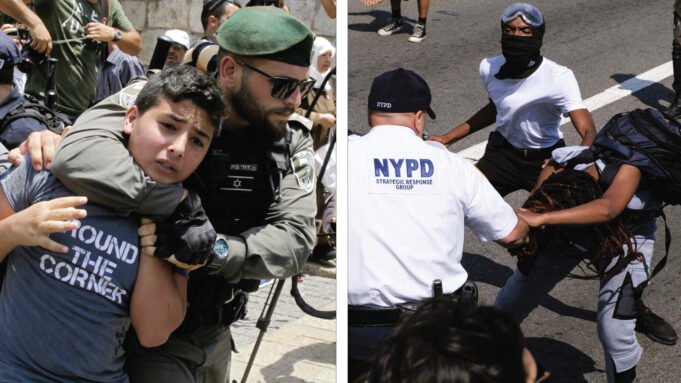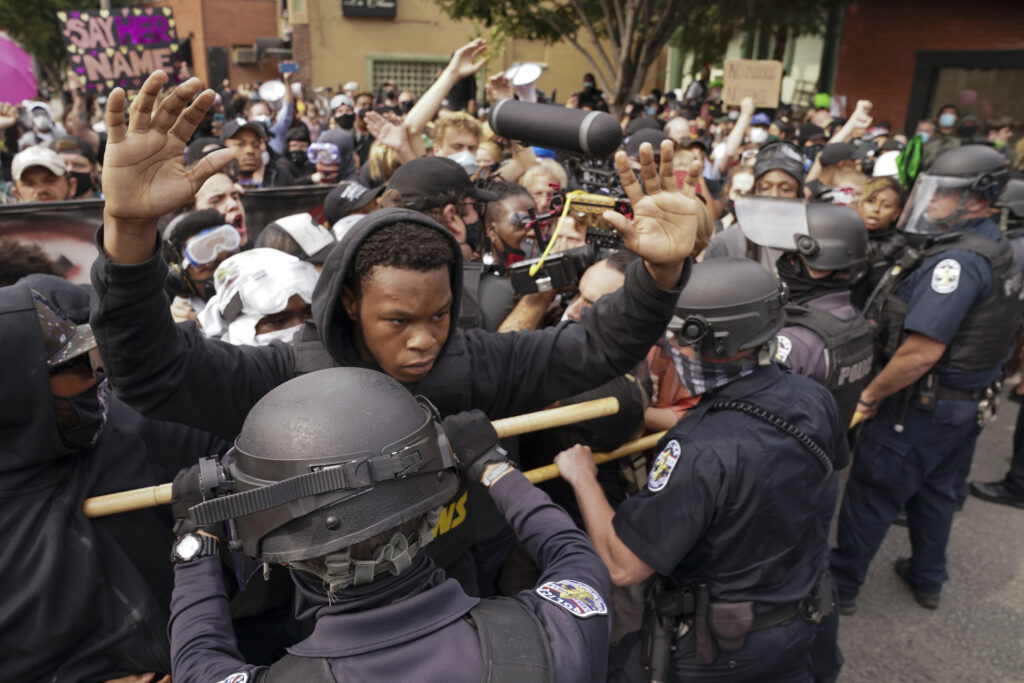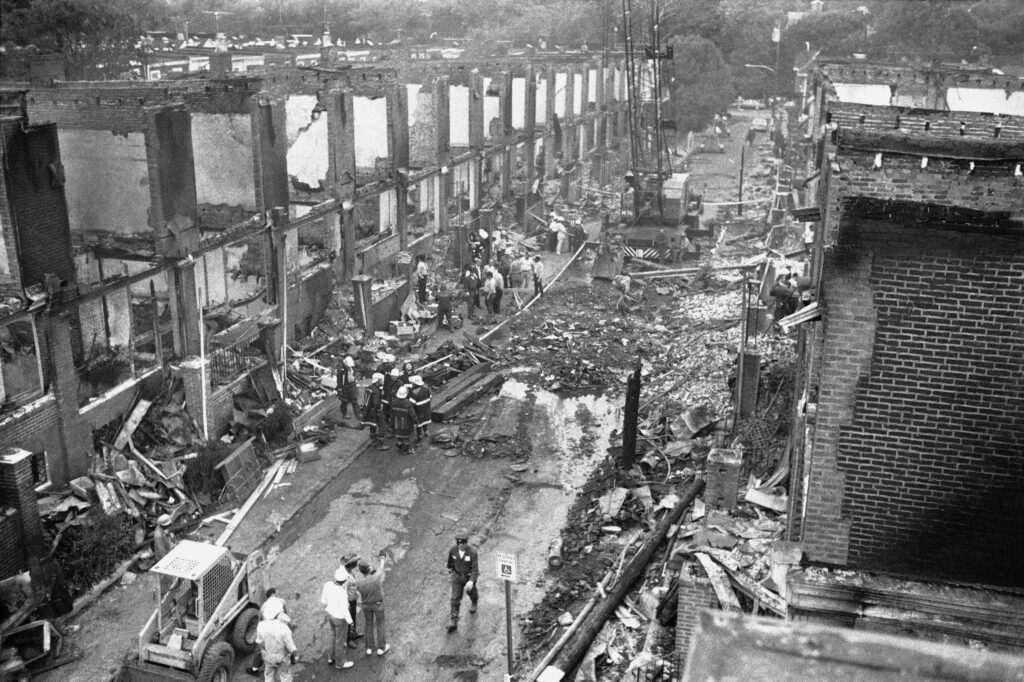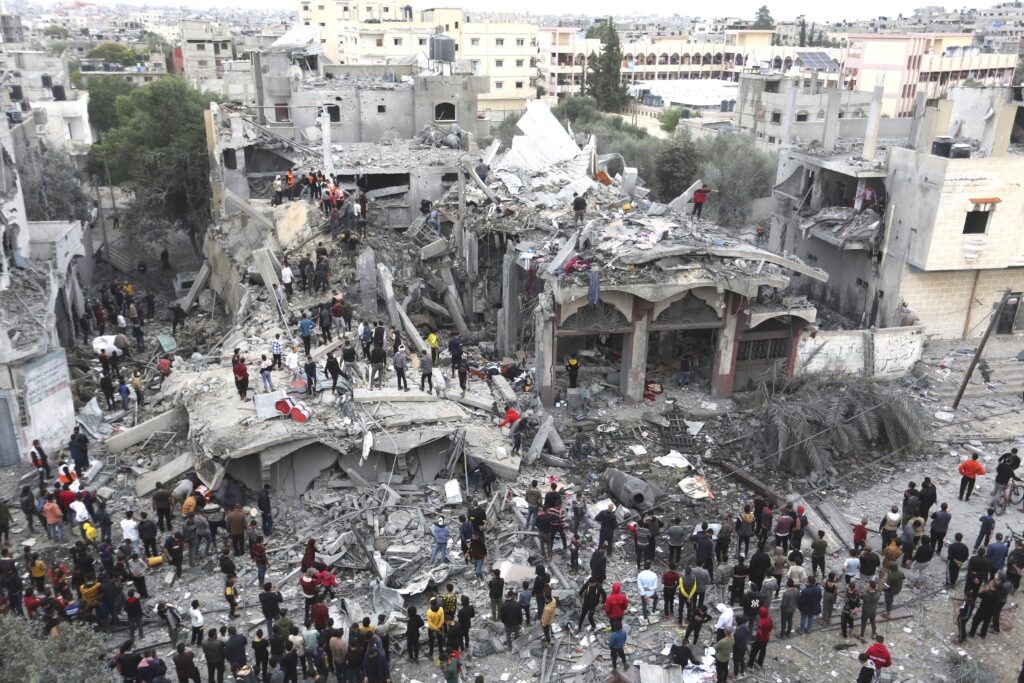The Final Call examines the historical parallels and intertwined struggles of Blacks in America with the Palestinian people for freedom, justice, and equality.
The temporary halting of the bombarding of Gaza by the Israeli occupation forces is no more, as attacks resumed on the Palestinian people at Final Call press time. With carnage and devastation in Gaza dominating media since early October, an already intensifying universal cry for justice was propelled into overdrive. From the Middle East to Africa, Asia, Europe and the Americas, activists, change agents, and peace advocates are amplifying their condemnation of Israel’s atrocities on the Palestinian people.
They also condemn the sustained backing of America’s upkeeping of Israel’s oppression.
Among those who had historic solidarity with Palestinians were Black people in America. They identify despite being separated by thousands of miles, language, and culture.
“The solidarity stems from the fact that Israel is one of the largest recipients of U.S. foreign aid, which suggests that at a moment in this country where hunger stalks the land, and the unhoused population continues to grow, our tax dollars are being stunted towards Israel,” said Dr. Gerald Horne, University of Houston scholar and historian.
“And certainly, it’s fair to say that Israel then uses our tax dollars to repress Palestinians, which is increasingly difficult,” he said. Dr. Horne told The Final Call the connection is part of a tradition that spans back decades into the 20th century.
“If you look at the 1956 Suez Crisis, where Israel, Britain, and France attacked (Gamal Abdel) Nasser’s Egypt, I have maintained that when certain spokespersons for the Nation of Islam spoke out against that attack, that helped to enhance their popularity amongst Black Americans, which suggests that Black Americans were not in favor of this attack,” said Dr. Horne. Similar dynamics were seen with the “Six Day War” of 1967, and the Yom Kippur War, also known as the Ramadan War in October 1973, he points out.
Black-Palestinian harmony existed between leaders, organizations and movements. Whether it was the Most Honorable Elijah Muhammad and in later years, the Honorable Minister Louis Farrakhan of the Nation of Islam; Malcolm X and his articles on the “Logic of Zionism”; Kwame Ture and the Student Nonviolent Coordinating Committee as well as the All African People’s Revolutionary Party and many other groups.
When Reverend Jesse Jackson ran for president during the 1980s and established bridges with the Palestinians, he was denounced as anti-Jewish. Many Blacks tightened their bond with the Palestinians. Before that, Andrew Young served as America’s UN Ambassador under President Jimmy Carter and was pressured to resign over alleged contacts with the Palestine Liberation Organization. Many Black folks objected to the pressure.
As Muslims and leading voices for Black self-determination Minister Farrakhan and the Honorable Elijah Muhammad stood for Palestinian self-determination.
“There is a saying by Prophet Muhammad (peace be upon him), that one is not a Muslim, one is not a righteous person, until one loves for his brother, what he loves for himself,” Minister Farrakhan told reporters in a December 1997 visit to occupied Palestine, during his World Friendship Tour III.
“The Israelis wanted a state. They wanted a flag. They wanted an independent and sovereign land. This they have. The Palestinians want and deserve the same thing,” he said. The Minister consistently has warned America and Israel that peace will remain elusive without justice.
At that time, he met with the late Palestinian leader Yasser Arafat who was president of the Palestinian Authority where they expressed their mutual admiration for one another’s commitment to the cause of justice for the downtrodden. President Arafat expressed his appreciation to Minister Farrakhan for his longstanding support for the Palestinian cause, and his fondness for the stances of the Honorable Elijah Muhammad in the cause of justice.
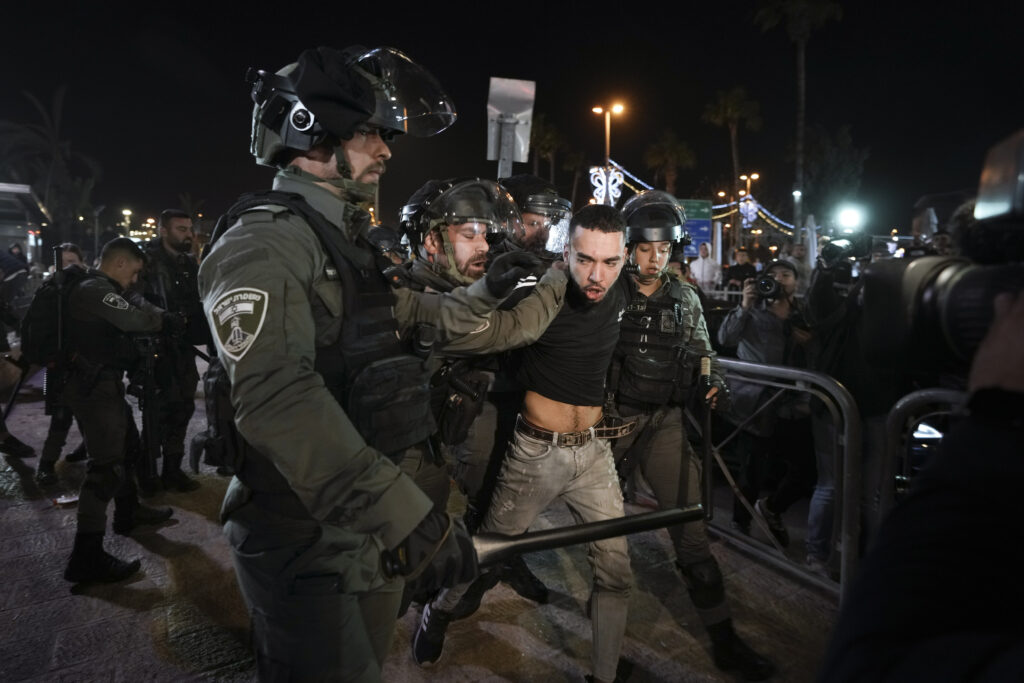
In Chapter 28 of His illuminating book, “The Fall of America,” Messenger Muhammad described America’s tyranny and, using scripture, issued a Divine warning. “She is full of blood from murdered people,” He wrote.
He warned America from the Bible book of Habakkuk 2:12: “Woe to him that buildeth a town with blood, and stablisheth a city by iniquity!”
“America was founded and built with blood and established by iniquity. She killed the aboriginal inhabitants (Indians) to establish herself as an independent people at the great loss of lives of the original owners,” wrote Messenger Muhammad.
“Her great progress has been made by the work of iniquity. She has robbed many people; and the blood of her slaves, the so-called Negroes, has stained the earth here and elsewhere, stained by her hands,” He said.
By America’s underwriting Israel, Palestinian blood also stains her hands. There are shared parallels between Blacks and Palestinians. Both experienced apartheid—the systemic segregationist control of movement by their tormentors. America, like Israel, is a settler colonial power that for Black people was the bastion of enslavement and oppression, which has yet to be accounted for in terms of reparatory justice.
“I think people need to look back into their own history. That’s why history is so important. Because we are people who have been dislocated, kidnapped from our homeland, in a land where we have been oppressed and exploited for centuries,” said Abayomi Azikiwe, political analyst and editor of the Pan-Africa News Wire.
“The situation in Palestine is that the indigenous people have been disposed of illegally in a circumstance that goes back over 100 years with the world Zionist movement that decided Palestine was their territory,” explained Mr. Azikiwe.
With the backing of Britain, America, and other imperialist nations, the land was turned over to European Zionists in 1948. “So that’s the origin of the situation,” said Mr. Azikiwe, adding, “You can also look in South Africa, Zimbabwe—formerly Rhodesia—and other countries in Africa that had to fight for their independence and national liberation.”
These, like America and Israel, were also European settler colonies that brutally ruled the African indigenous people.
“If you look at how our people, African Americans, are treated in this country, it’s quite similar to what the Palestinians have to endure—disproportionately imprisoned … attacked routinely by the police … racists who go around and destroy people’s communities; kill them, just for being who they are,” said Mr. Azikiwe.
Then, any retaliation on the part of the oppressed is met with repression, and for Palestinians, “extreme genocidal violence.” Palestinian liberation, like Black liberation in America, represents an inherent threat to Israeli settler colonialism and apartheid, which was constructed on ethnic cleansing, land theft, terrorism, and Palestinian dehumanization.
That experience parallels the Black experience in America’s own history of settler colonialism, slavocracy, and systems of racial segregation and apartheid as demonstrated in Black Code laws, Jim Crow and their various iterations. Black and Palestinian marginalization are driven by the racist ideologies of White supremacy and Zionism, respectively.
Black and majority-Black thriving townships established in the early 1900s in the United States were targeted for destruction by Whites. A period in the U.S. known as “Red Summer” saw White supremacist terrorism and racial riots occur in more than three dozen cities across the United States, causing death and destruction.
Likewise, Palestinians have been driven from their homes, their property confiscated or destroyed and their lives lost at the hands of the Israeli military, law enforcement and settlers.
According to liberationschool.org, “Historically and presently, there are clear parallels between the oppression suffered by the Black and Palestinian nations. From racial profiling, to the incarceration of youth to Whites-only roads, neighborhoods, buses, housing and schools, White supremacy in the United States closely resembles the occupation of Palestine,” the website noted in an article titled, “The long history of Black and Palestinian solidarity.”
There are 8,000 Palestinians in Israeli prisons where 2,500 are held under “administrative detention,” meaning without charge nor trial and mistreated in horrific conditions. The U.S. has over two million disproportionately Black and Brown people incarcerated, including political prisoners imprisoned for holding uncompromised principled positions of justice.
According to the anti-Zionist group Jewish Voices for Peace, “Since the early 2000s, thousands of U.S. police officers, sheriffs, border patrol agents, ICE officers and FBI agents have trained with Israeli military and police forces.”
These exchanges reinforce American law enforcement practices of expanding surveillance, justifying racial profiling and suppressing public protests through use of force, the group noted, in a March 2022 article on its website.
“While some of these tactics may be new, the racist ideology underlying their implementation is endemic to U.S. law enforcement since its creation. The contexts of Israel’s regime of military occupation and apartheid against Palestinians, and the U.S. legacy of White supremacy, mutually reinforce each government’s state violence. During these police exchanges, U.S. law enforcement learned tactics developed through Israel’s military occupation and also learned to think of themselves as combatants,” the group notes.
These issues impacting both communities must not be glossed over, activists point out.
Liberationschool.org points out that Black-Palestinian solidarity “continues today on many fronts, including support for the international Boycott, Divestment and Sanctions movement. Prominent Black intellectuals, including Angela Davis, Cornell West and Alice Walker, have endorsed the call for BDS.” The late author Toni Morrison, former U.S. Representative Cynthia McKinney, New York Councilman Charles Barron are among prominent Blacks who have stood up for Palestinian rights, the website noted.
“As the viciousness of the racist U.S. and Israeli ruling classes escalate, the tradition and ongoing practice of Black-Palestinian solidarity is just as important as ever. As well as its strategic importance, the unity of African American and Palestinian freedom fighters illustrates a key theme in Black history—the Black struggle has always thrived on internationalism, and cannot be separated from the struggle of all peoples around the world fighting for liberation,” the article noted.
For Pam Africa, longtime political activist, member of the group MOVE, and founder of the Friends and Family of Mumia Abu Jamal, the parallels between the struggle of Blacks and Palestinians are clear.
“I’ve been upset about prisoners in Palestine for years, and even like right now when they release them, they are releasing them to what? When the Israelis are released, they get released into the hands of people that are waiting … a warm home to go to, and everything else,” said Ms. Africa.
She was referring to the exchange of women and youth prisoners and captives held by Israel and Hamas during the now-collapsed recent seven-day ceasefire. Palestinians are released into hostility where a place of safety is nonexistent, Ms. Africa told The Final Call. Many returned to a place of slaughter at the hands of their enemies. “From one hell into another hell,” she said.
The longtime activist for political prisoners noted many of the Palestinians reported torture and other forms of abuse in Israeli prisons redolent to the experiences of political prisoners in America.
Black political prisoners like their Palestinian counterparts incarcerated for resisting injustice are released under conditions knowing they will not live long, Ms. Africa said.
She said Black revolutionaries like Dr. Mutulu Shakur, Marshall Eddie Conway, Delbert Africa, Chuck Africa, and Russel Shoatze were all released under “humanitarian” conditions. They did not live long after. “They sent them home to die,” said Ms. Africa. These are the realities that inform why solidarity must not be broken, she argued. Final Call staff contributed to this report.












